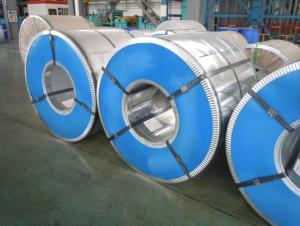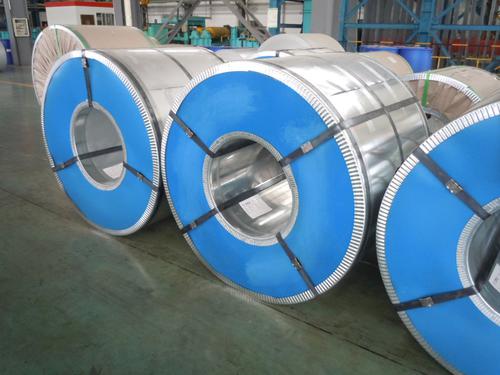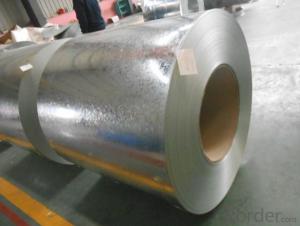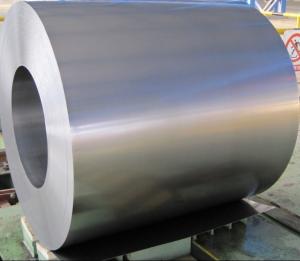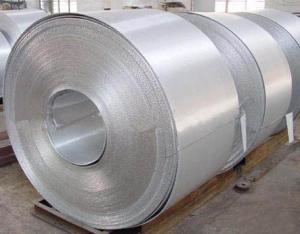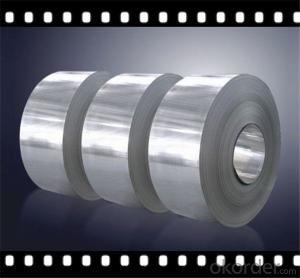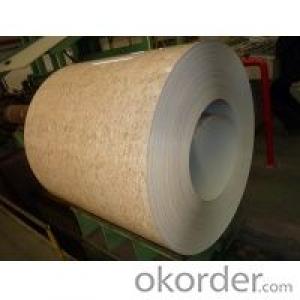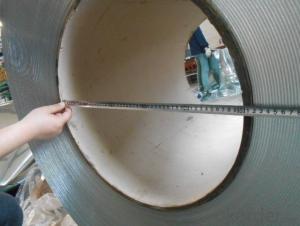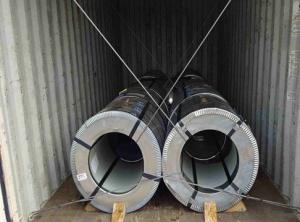Hot Dipped Galvalume Steel Coil-Anti Finger Print
- Loading Port:
- China Main Port
- Payment Terms:
- TT OR LC
- Min Order Qty:
- -
- Supply Capability:
- -
OKorder Service Pledge
Quality Product, Order Online Tracking, Timely Delivery
OKorder Financial Service
Credit Rating, Credit Services, Credit Purchasing
You Might Also Like
Aluzinc Steel Coil
Steel Grade & Standard:G550
Spangle:Minimized Spangle
Aluzinc Coating Mass:AZ40
Surface Treatment:Chromated, Unoiled, NonSkinpassed, Anti-Finger Print
Steel Grade & Standard:G550
Spangle:Minimized Spangle
Aluzinc Coating Mass:AZ40
Surface Treatment:Chromated, Unoiled, NonSkinpassed, Anti-Finger Print
- Q: How are steel coils tested for mechanical properties?
- Steel coils are tested for mechanical properties through various methods, including tension testing, hardness testing, and impact testing. Tension testing involves applying force to the coil until it breaks, allowing for the measurement of its strength and elongation. Hardness testing determines the coil's resistance to indentation, providing insight into its overall strength and durability. Impact testing determines the coil's ability to withstand sudden applied loads by subjecting it to a high-velocity impact and measuring its ability to absorb the energy. These tests help ensure that steel coils meet the required mechanical properties for their intended applications.
- Q: What are the safety precautions for handling steel coils?
- When handling steel coils, it is important to follow certain safety precautions to prevent accidents and injuries. Some of these precautions include wearing appropriate personal protective equipment (PPE) such as gloves, safety glasses, and steel-toed boots to protect against cuts, impacts, and eye injuries. It is also essential to ensure proper training and knowledge of correct lifting techniques to avoid strains or back injuries. Additionally, using equipment like cranes or forklifts with appropriate capacity and stability is crucial for safe handling and storage of steel coils. Regular inspection and maintenance of equipment, as well as adhering to proper storage procedures, are also important safety measures to prevent incidents.
- Q: All of my friends say that if a car made of mostly carbon fiber would crash into a full steel car, or vice versa, the steel car would be DESTROYED and the carbon fiber would drive away, if not, easily repairable.
- Depends on the design/construction.
- Q: How are steel coils used in the production of automotive engine components?
- Steel coils are used in the production of automotive engine components by being processed and shaped into various parts, such as pistons, crankshafts, and connecting rods. The coils are first cut, stamped, and formed into the desired shapes, and then undergo heat treatment and other machining processes to enhance their strength and durability. These components are crucial for the proper functioning of an automotive engine, as they provide structural support and help convert the energy generated by the combustion process into mechanical motion.
- Q: How are steel coils processed for further use?
- Steel coils are processed for further use through a series of steps that include uncoiling, leveling, cutting, and sometimes additional treatments such as galvanizing or painting. These processes ensure that the steel coils are prepared and ready to be used in various industries such as automotive, construction, or manufacturing.
- Q: i would like to make a dmascus steel knife, i have the cable but im not sure if its damascus steel or not, how do i tell? and if it isnt damascus steel how do i make a bar of it?
- Here's what you need, the cable should be a minimum of 9/16 with large wires. You need some borax (20 mule team from the store). A good hot coal, coke, or gas forge. If the cable has fiber rope in the center it will need to be removed. Fuse the ends of the cable to keep them from coming apart. I use my welder and while I'm at it I weld a handle to make it easier. Heat it in the forge when the forge is properly heated, rotate it. Some people will burn the oil out, but I've found that the forge does that just fine. Rotate the cable while it's heating. When it begins the turn red pull it out and sprinkle the borax over it, don't hold back use a lot. It will begin to melt and bubble into the steel. Put the cable back in the forge, rotate and watch. This is the critical part. When the steel starts to turn from orange/yellow to almost yellow/white take it out and lightly (I use a 2lb hammer) begin hammering the cable into a square or rectangle. If you do it right you'll notice that it will begin to fight the hammer, that's when you know the weld it taking place. You'll have to repeat the process down the length of the cable. Once you have the billet made you can begin the process of shaping the edge and tang. Once you have it shaped, follow proper forge procedure then grind all the yuck off and finish shaping. Then harden and temper and finish it out. Good luck. I almost forgot a very important part. Befor you start hammering put the cable in a vice while at welding temp (if you are strong you can use a couple of plyers) and twist it tight. On the next heat hold the cable in your left and and lay it on the anvil. Concentrate on your light hammer blows being on your side of the cable. This forces the cable strands together. If you are using smaller cable like 9/16 you can double the cable up and weld two peices together, it is easier and makes for a prettier blade. Doing this you don't have to worry about twisting the cable and you can hit it much harder to start with.
- Q: I saw this really pretty ring online and it was made of steel. Is this a good ring? If I were to wash my hands with it on, would it rust and turn my finger green?
- Steel rust is brown not green! Very much expected to be of one type of stainless steel, and you should have no problem.
- Q: How are steel coils used in the manufacturing of food processing equipment?
- Steel coils are used in the manufacturing of food processing equipment as they provide strength, durability, and resistance to high temperatures. These coils are often used to construct the frames, structures, and components of food processing machinery, ensuring stability and reliability during the manufacturing process.
- Q: Where can a find a steel scrubber. Its great to clean cooking vessels. Would be great if someone gives me an idea. I did not find it at CVS, but was in a hurry, will try again tomorrow.
- I posted this earlier to a similar question... Really burnt on gunk in the bottom like milk or blackened food can easily be cleaned out of stainless steel pots and pans by sprinkling baking soda in the bottom, covering with vinegar, let simmer with a little water for 5 min. Let cool, scrub out with a vinyl scrubby. or I use a lot of stainless steel for cooking and over the years have found a very inexpensive solution to cleaning them especially the ones with burnt food stuck at the bottom. I use Used fabric softner sheets (sheets that i have already used in the dryer for my clothes) and have them soak in water in the dirty pan overnight. Next morning i use the same sheet as scrubber to clean the pan and all the burnt food comes off easily leaving a new look to the pan. Try it this works.
- Q: I'm getting my nose pierced, meaning that i have to keep the piercing in for a prolonged time. i've always had reactions when wearing sterling silver or fake earrings (i dont know what types of metal they were) after wearing it overnight. Will I get a reaction on my nose piercing if the stud is surgical steel?
- The chances of a reaction from the stud is minimal. Surgical steel is an alloy specifically designed to make sterile safe surgical equipment. Often made with titanium or nickel, surgical steel is highly reactive and forms an oxidized layer when made. This layer creates a stable surface. The titanium and nickel are both very hard and resistant to scratches which make for easy sterilization. This will help keep your piercing clean. Be sure to follow the directions you receive when you get your piercing and keep it clean.
Send your message to us
Hot Dipped Galvalume Steel Coil-Anti Finger Print
- Loading Port:
- China Main Port
- Payment Terms:
- TT OR LC
- Min Order Qty:
- -
- Supply Capability:
- -
OKorder Service Pledge
Quality Product, Order Online Tracking, Timely Delivery
OKorder Financial Service
Credit Rating, Credit Services, Credit Purchasing
Similar products
Hot products
Hot Searches
Related keywords
